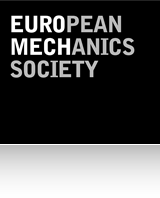468 – Multi-scale Modelling in the Mechanics of Solids
Date:
29 June 2005 – 1 July 2005
Location:
St. Petersburg, Russia
Contacts:
Chairpersons:
Prof. N.F. Morozov
Institute for Problems in Mechanical Engineering
Russian Academy of Sciences
Phone: +7 812 321 4788, Fax: +7 812 321 4771
E-mail: morozov@nm1016.spb.edu
Prof. I.G. Goryacheva
Institute for Problems in Mechanics RAS
Prof. M. Wiercigroch
University of Aberdeen, UK
EUROMECH contact person: Prof. I.G. Goryacheva
Website
The main scope of the Colloquium is to integrate and stimulate research interests in the fundamental constitutive modelling in mechanics of solids, in particular, to assess the progress in the fast growing area of multi-scale modelling in continuum and discrete mechanics. The topics include various approaches to modelling of complex media (e.g. mechanics of granular materials and fine cohesive powders, damage and fracture processes, phase transitions, moving boundaries and inhomogeneities in solids), micro- and meso- models (molecular dynamics, micro-contact modelling) combined with macro- models (continuum mechanics of solids, granular dynamics).
The major difficulty in the description of media behaviour relates to their inherent abilities to undergo structural changes which are manifested with separation and rearrangement of particles, processes of damage and fracture, phase transitions (or moving boundaries) and inhomogeneities of various kinds. The solution requires an essential change in formulating constitutive equations describing evolution processes occurring in the medium. It is not only difficult to predict the dynamic behaviour of the medium, but even to determine characteristic parameters of the medium and to obtain robustly repeatable experimental data. This remains an unsolved scientific problem, and it is thought that a significant progress can be made if the Colloquium gathers a good mixture of theoreticians, engineers, and experimentalists, who can approach this problem by different methods and techniques. It is hoped that the Colloquium will consequently initiate and stimulate relevant discussions between different scientific schools.
